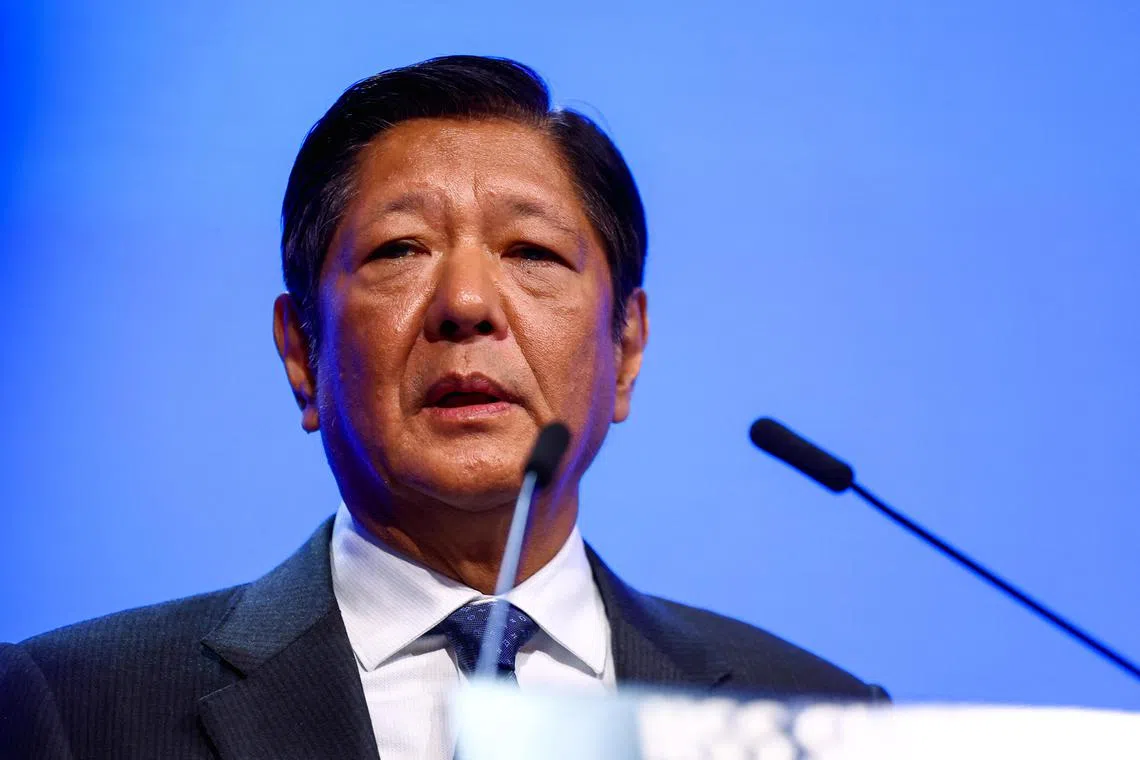Shangri-La Dialogue 2024
Philippines’ Marcos slams ‘illegal actions’ in disputed South China Sea
Sign up now: Get ST's newsletters delivered to your inbox

Philippine President Ferdinand Marcos Jr denounced what he called illegal actions in the South China Sea.
PHOTO: REUTERS
SINGAPORE – Philippine President Ferdinand Marcos Jr denounced on May 31 what he described as “illegal, coercive, aggressive and deceptive actions” being taken in the disputed South China Sea.
Speaking at the opening of the Shangri-La Dialogue defence summit in Singapore, Mr Marcos said the Philippines and other South-east Asian countries have a vision for “peace, stability, and prosperity” in the South China Sea, but that this was being undermined by other actors, without naming China.
“Unfortunately, this vision remains for now a distant reality. Illegal, coercive, aggressive and deceptive actions continue to violate our sovereignty, sovereign rights and jurisdiction,” Mr Marcos said.
Encounters between the Philippines and China
China’s coast guard has stepped up so-called grey-zone activities such as use of water cannons, collisions and ramming tactics to try to stop Philippine resupply and patrol missions. It has also deployed fishing boats that the Philippines and its allies consider militia.
After his speech, Mr Marcos called security in the South China Sea, through which a huge volume of trade passes, a global issue.
A reporter asked Mr Marcos whether China would be crossing a “red line” if one of its coast guard ships kills a Filipino with water cannons.
“If a Filipino citizen was killed by a wilful act, that is very close to what we define as an act of war,” he replied. “We would have crossed the Rubicon. Is that a red line? Almost certainly.”
The Philippines, a treaty ally of the United States, is a key focus of Washington’s efforts to strengthen alliances and partnerships in the Asia-Pacific region as it seeks to counter China’s growing military might and influence.
Given its position in the South China Sea and proximity to self-ruled Taiwan, which China claims as its own, Philippine support would be crucial for the US in the event of any conflict.
Mr Marcos said tensions between the US and China
“Their rivalry is constraining the strategic choices of regional states. Their contest is exacerbating flashpoints and has created new security dilemmas,” he said.
“The continued stability of this region requires China and the United States to manage their rivalry in a responsible manner,” said Mr Marcos.
The Philippines expanded a 2014 agreement in 2023 to give US military access to another four if its military bases
The Enhanced Defence Cooperation Agreement allows US troops to rotate through and store defence equipment and supplies, and has infuriated Beijing. AFP, REUTERS


